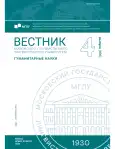The Сoncept of Love in the XVII Century British Poetic Discourse: Content Features and Dispersion of Grammatical Means
- Autores: Markova Y.B.1
-
Afiliações:
- Moscow State Linguistic University
- Edição: Nº 4(898) (2025)
- Páginas: 55-62
- Seção: Linguistics
- URL: https://journal-vniispk.ru/2542-2197/article/view/291911
- ID: 291911
Citar
Resumo
The article focuses on the content features and the dispersion of grammatical means expressing the concept of “love” in the British poetic discourse of Early New English. It pursues the goal of studying the representation of emotiveness on the example of 500 emotive sentences of Early New English. The basic methods of research applied by the author were those of context and quantitative analysis. The most frequently used structure in 17 th-century British poetic discourse, representing the category of emotiveness on the syntactic level, is the exclamatory sentence with interjections and exclamatory particles at the beginning. The author views lexical means as a way of forming a certain image of the object of love.
Palavras-chave
Sobre autores
Yulia Markova
Moscow State Linguistic University
Autor responsável pela correspondência
Email: julia@themarkovgroup.com
PhD in Philology, Associate Professor at the Department of English Grammar and the History of the English Language, Faculty of the English Language
RússiaBibliografia
- Shahovskij, V. I. (2008). Lingvisticheskaya teoriya emocij = Linguistic theory of emotions. Moscow: Gnozis. (In Russ.)
- Len’ko, G. N. (2015). Analiz kategorii emotivnosti i smezhnyh s neyu ponyatij =Analysis of the category of emotivity and similar notions. Vestnik of LGU named after A. S. Pushkin, 1, 84–91. (In Russ.)
- Prohorov, Y. J. (2008). V poiskah kontsepta = In the search for concept. Moscow: Flinta. (In Russ.)
- Karasik, V. I. (2007). Yazykovye klyuchi = Language keys. Volgograd: Paradigma. (In Russ.)
- Gruzberg, L. A. (2003). Concept. In Kozhina, M. N. (Ed.), Stylistic encyclopedic dictionary of the Russian language (pp. 181–184). Moscow: Flinta: Nauka. (In Russ.)
- Askol’dov, S. A. (1997). Koncept i slovo = Concept and word. In Russkaya slovesnost’. Ot teorii slovesnosti k strukture teksta. Antologiya (pp. 267–279). Moscow. (In Russ.)
- Zinov’eva, E. I. (2003). Ponyatie «koncept» v ramkah speckursa «Yazykovaya kartina mira: konceptosfera russkogo yazyka» = The term “concept in the course “Language map: the sphere of concepts in the Russian language. Lingvistika, metodika i kul’turologiya v prepodavanii russkogo yazyka kak inostrannogo. Collection of articles (pp. 16–21). St.Petersburg: Politekhnika. (In Russ.)
- Kolesov, V. V. (2004). Yyzyk i mental’nost’ = Language and mentality. St.Petersburg: Peterburgskoe Vostokovedenie. (In Russ.)
- Zheltukhina, M. R. (2003). Tropologicheskaya suggestivnost’ mass-medial’nogo diskursa: o probleme rechevogo vozdejstviya tropov v yazyke SMI = Tropologic suggestivity in mass media discourse. Moscow: Institut yazykoznaniya RAN; Volgograd. (In Russ.)
- Lyapin, S. H. (1997). Konceptologiya k stanovleniyu podhoda. Concept. Scientific works of the concept center. Arhangel’sk, 1, 11–35. (In Russ.)
- Kubryakova, E. S. et al. (1996). Kratkij slovar’ kognitivnyh terminov = Concise dictionary of cognitive terms. Ed. by E. S. Kubryakova. Moscow: Faculty of Philology. Lomonosov MSU. (In Russ.)
- Shahovskij, V. I. (2004). Emocional’no-smyslovaya dominanta v estestvennoj i hudozhestvennoj kommunikacii = Emotional semantic dominant in casual and belles-lettres communication. In Yazyk i emocii: lichnostnye smysly i dominanty v rechevoj deyatel’nosti = Language and emotions: Personal meanings and dominants in speech. Collection of scientific works. Volgograd: Center. (In Russ.)
- Orlova, N. N. (2009). Yyzykovye sredstva vyrazheniya emocij: sintaksicheskij aspect = Language means of expressing emotions: syntactic aspect: Senior Doctorate of Philosophy. Rostov-on-Don. (In Russ.).
- Fromm, E. (2023). Isskustvo lyubit’ = The art of love. Moscow. (In Russ.)
- Neborsina, N. P. (1997). Sintaksis stihotvornoj rechi kak predmet lingvopoeticheskogo issledovaniya (na materiale angliiskoi poezii XVI–XX vv.) = Syntax of poetic discourse as a subject of linguistic analysis (English poetry of 16–20 cc.). Doctoral thesis in Philology. Moscow. (In Russ.)
- Greenbaum, S. (1996). The Oxford English Grammar. Oxford University Press.
Arquivos suplementares










